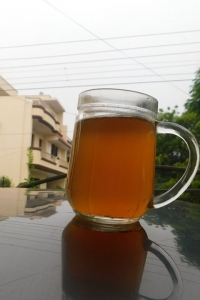
I was starting work in a new city. A city much smaller in size than Delhi which was home to me. A friend suggested that I check out a house owned by an old-widow who was her acquaintance and had lost her husband recently to brain-tumour.
“You can stay with Mrs Tibba. She was formerly our neighbour, she has lost her husband recently and is looking for a tenant,” she said.
This seemed like a good arrangement to me. Being a single woman, it would be good to get the support of another single woman and we could develop a warm bond, or so I assumed. Being trained as a feminist geographer, I had too much faith in feminist solidarity, but real life is often removed from theory.
I went to meet her on a February afternoon. She welcomed me warmly with a cup of tea and some wheat biscuits that she had baked with the help of somebody in the neighbourhood. As we bonded over our cups of tea, I noticed the pictures of her late husband and her middle-aged children who have settled abroad with their respective spouses and children. There was a large wedding picture of her son and daughter-in-law in their wedding attires. There was a picture of Mr and Mrs Tibba with their children and grand-children. They seemed like a happy family where everyone was doing well. There were several pictures of their travels abroad.
She showed me the room and we discussed the rent and food arrangements. I felt happy that I had found a place to stay and an elderly friend in what was a completely new city for me.
I joined her household on the 1st of the subsequent month. In the first week of my stay with her, I noticed that she was fairly obsessed with maintaining cleanliness and order in her house. I was given instructions to wash my clothes early in the morning and not in the evening after I got back from work. I had to rinse the plates after eating in them so that the domestic helper would clean them properly with soap later. I had to put my wet towel out in the sun and not leave it in the bathroom. The list of instructions was long. I assented to all of them since I had little choice.
While I marvelled at some of these house-keeping tips for their usefulness, I found the others to be preposterous. Houses are meant to be lived in and used. Not to be scrubbed all the time.
“When are we going to live life then?” I wondered.
Anyway, since it was her house, I had to follow her rules and decided to do so to avoid conflict.
One day I asked her where I could get my clothes ironed? She pointed to a tiny wooden kiosk in the lane where a man would stand with his huge iron full of hot coals and iron the clothes of the families in the neighbourhood. She instructed me, “The rate is Rs 4 per cloth, don’t give more than that.”
I went with my bundle of washed clothes to the ironing man.
“How much will you charge per cloth?” I asked
“It’ll be Rs 5 per piece, please,” he replied.
“But Mrs Tibba said it was Rs 4 for a piece,” I argued.
“What are you talking Madam? That was the rate 2 years ago. And who are you listening to – Mrs Tibba? She never gets her clothes ironed. She is a miserly, selfish lady,” he said, emphatically. “You are new here. What do you know? Everybody here knows the way she treated her husband. We were glad when he died. What is the point of living a life that he was living anyways?” he added, sarcastically.
“What? What was that he said?” I wondered but decided to ignore it as small talk.
I noticed Mrs Tibba was as obsessed with her clothes as she was with her house. She wanted to wear a new outfit to the temple every day. She proudly displayed to me all the new clothes she had bought recently. I observed that she loved bright reds, oranges, and pinks. She did take the time to dress up with matching jewellery and make-up to go for her kitty-party groups and temple visits. It seemed that she had an active social life and was invited by many people to prayer-meetings in their houses. She took me along for one such meet.
“I’ll take you. But please, wear nice clothes. I don’t want to move around with a person who is not well dressed,” she said.
Mrs Tibba had assigned a separate cup and glass for me to drink tea and water in. She did not want me to use any other cups, plates, and glasses in her kitchen other than those she designated to me. I had noticed that the domestic helper Vaani, a dark, petite lady in her 50s who carried herself with dignity refused to take anything to eat or drink from Mrs Tibba’s kitchen. This was interesting for me to watch since it is a common practice in India to offer food to domestic helpers and they most readily accept those offerings.
One day while Mrs Tibba was off to buy milk, I questioned Vaani
“You never eat or drink here? What’s the matter?”
“Oh don’t you know? Mrs Tibba offers me stale or rotten food and drinks that is past its expiry date all the time,” she replied. “Plus, it is so undignified, the way she gives that food to me. It is like you are giving it to an animal,” she added. “Beta, we are poor people, but we always eat fresh food."
Mrs Tibba had an interesting relationship with Vaani. While she was always yelling at her, she also trusted her enough to come behind her back and clean the house while she was visiting her children abroad. She had previously gone overseas for a duration of 3 months and left her house keys with the neighbours to get the cleaning done by Vaani.
Vaani had worked for Mrs Tibba for over 8 years and had endured many insults silently. She had witnessed the plight of Mr Tibba and had been present during the period of his brief illness of 2 months before he passed away due to brain-tumour.
“I am so talented,” Mrs Tibba stated one day.
“I could go to live with my son in the USA, but I am so talented and people value me so much here. I am always invited to prayer meetings since I sing the hymns so well. Plus, I dress-up so well and am multi-talented so many women are jealous of me here,” she added.
I rolled my eyes in mild disgust. I hadn’t seen any extraordinary talent in her. A lot of women can sing hymns so well. I noticed how she wanted to dominate and control the prayer group in the temple. She was constantly giving instructions to the temple priests and the women in prayer groups.
“I am out of here,” I said to myself as I decided to keep away from her temple shenanigans.
As the months passed, she tried to control my life by giving me micro-instructions. Sometimes it would be too much for me to bear. I decided to spend more time at my home, back in Delhi in the warm presence of my mother who was starkly opposite in temperament than Mrs Tibba. I started to take more ‘work from home’ assignments to escape her overbearing nature. I found the task of finding a new house in the new city too daunting.
One day she told me that her son had planned a trip to Europe for a fortnight and I should stay at her place for those two weeks while she was away. For some reason she was very scared of burglars breaking into her house. Although I felt that her house was among the least attractive for thieves among all the other fancy houses in the neighbourhood, I agreed to the arrangement. It would give me some time in the house without her constant bickering.
Her absence would also give me the opportunity to walk in the neighbourhood and hunt for a new room to rent. As soon as she left for the airport, I jumped into action. Many aunties in the neighbourhood had let out their places to working girls and boys in the city. I began to walk around knocking on several doors to find if they had a spare room that they could rent to me.
The auntie next door advised me that since Mrs Tibba was a quarrelsome woman, I would not get a room to rent in this neighbourhood so easily. People were apprehensive that she will pick up fights with them. She suggested that I continue my search further away from the neighbourhood.
She said “Beta I used to feel so much pity for Mr Tibba. She started yelling at him from 4 am in the morning. While people in other houses started their morning prayers, the whole neighbourhood resonated with her screams. Sometimes I felt like crying at his plight and tears would come when I looked at his face.”
“What?” I asked “What did she yell at him for?”
“Ohh for every single thing. About how he had kept things at the wrong place. About how the money he earned was never enough for her. Of how he couldn’t spend any of it without seeking her permission and so on,” she explained.
“What?” I asked as my eyes widened.
“Yes. It is true. My husband was so tired of all the shouting and screaming that he once said that he would have slapped Mrs Tibba if she was his wife,” she added. “You know what happened on the day Mr Tibba had that attack? I’ll tell you. Mrs Tibba wanted her cold-drink so badly that she gave him a Rs 20 note to buy a bottle of coke. It was a hot afternoon and Mr Tibba came from the market carrying that bottle with him. He reached his house door and collapsed on the ground. Mrs Tibba was on the phone but came running as she saw him on the floor. She immediately rang me up to help her lift him up. Me and my husband rushed to help them out. We called the Doctor too. Mrs Tibba kept insisting that it may be a gastric attack but we were sure that there was something more serious going on. The Doctor at the hospital said that Mr Tibba had suffered a paralytic attack and should be rushed to the bigger hospital. At the bigger hospital, the tumour was detected and it was a big one,” she clarified.
As I heard her speak, a thought flashed across my mind that it was not the tumour that killed the old man, but it was Mrs Tibba’s constant bickering, nagging and yelling that may have killed him a thousand deaths before he actually died of illness. I immediately recalled what the ironing man had told me when I first arrived in this neighbourhood. It was true, all of it.
I wondered if their children knew about all of this. And if they did – what the fuck were they doing chasing their American dreams while one of their parents heckled, abused and hit the other? The myth of the perfect happy family, the pictures of which were hanging in Mrs Tibba’s living room was shattered. I was happy that I had finally decided to move out of the hell-hole that Mrs Tibba called her home. I came into the living room and looked at the dead man’s picture sitting on the table. He had kind eyes and looked like a gentleman. I stared harder at the photograph. It seemed as if he had whispered, “It was not the tumour, it was her.”
About the Author







Comments